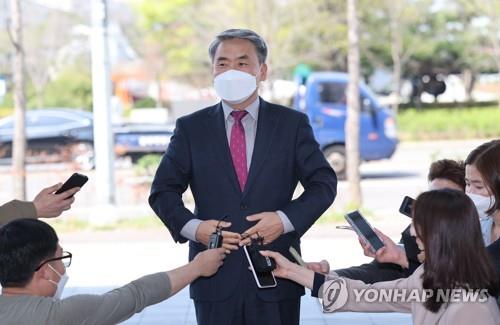- California Assembly OKs highest minimum wage in nation
- S. Korea unveils first graphic cigarette warnings
- US joins with South Korea, Japan in bid to deter North Korea
- LPGA golfer Chun In-gee finally back in action
- S. Korea won’t be top seed in final World Cup qualification round
- US men’s soccer misses 2nd straight Olympics
- US back on track in qualifying with 4-0 win over Guatemala
- High-intensity workout injuries spawn cottage industry
- CDC expands range of Zika mosquitoes into parts of Northeast
- Who knew? ‘The Walking Dead’ is helping families connect
Defense chief nominee vows stronger alliance, deterrence against N.K. threats
South Korea’s defense minister nominee on Wednesday vowed efforts to cement “cohesion” in the country’s alliance with the United States and sharpen deterrence against North Korea’s nuclear and missile threats.
During a parliamentary confirmation hearing, Lee Jong-sup, a former three-star Army general, highlighted his vision of a “robust national defense and sturdy military based on science and technology” to respond proactively to “threats from all directions.”
His nomination came amid tensions caused by a series of North Korea’s ballistic missile launches and concerns over the possibility of it carrying out a nuclear test or other provocative acts.
“(I) will increase cohesion in the South Korea-U.S. military alliance and expand mutually beneficial defense cooperation with the friendly nation,” he said. “(I) will strengthen the enforceability of the tailored deterrence strategy and expand areas of cooperation between the South and the U.S., including defense science and technology.”
Lee was apparently referring to the allies’ deterrence strategy tailored specifically to address evolving North Korean nuclear and missile threats.
Asked about whether South Korea has capabilities to handle the North’s nuclear threats, Lee stressed the need to “make the best use” of the U.S.’ extended deterrence — Washington’s stated commitment to using its full range of military assets, both nuclear and conventional, to defend its ally.
But he pointed out that the South cannot rely wholly on the U.S.
“We also need to bolster our deterrence and capabilities to respond to contingencies by developing non-nuclear, high-tech weapons,” he said.
The nominee also gave his assessment of North Korean leader Kim Jong-un’s recent remarks that hinted at the possibility of his country using nuclear arms for a preemptive attack.
“Conventional wisdom is that nuclear weapons are for a response to a nuclear (attack),” Lee said. “But (Kim’s remarks) signal that the North could use nukes in a different situation as well.”
On the question about what the North’s nuclear arms could target, Lee said, “I think South Korea could be (a subject).”
Noting the North’s persistent threats, Lee described it as an “evident” enemy. But he said a review is needed to determine whether to refer to the North as an enemy in the South’s defense white paper.
“North Korea currently threatens us with nuclear arms and missiles, and our citizens are considerably worried about it,” he said. “In that respect, North Korea is our evident enemy.”
Touching on the envisioned transfer of wartime operational control (OPCON), Lee said conditions should be met for Seoul to retake it from Washington.
The allies have been working on the conditions-based OPCON transition. The mutually agreed-upon conditions include Seoul’s capabilities to lead combined forces; its strike and air defense capabilities; and the regional security environment conducive to the handover.
Characterizing North Korean missile launches earlier this year as “provocations,” the nominee stressed his focus on developing the South’s deterrence capabilities and vowed to “sternly” respond to the North’s nuclear and missile threats.
During the hearing, lawmakers took issue with President-elect Yoon Suk-yeol’s campaign pledge to deploy more U.S.-made THAAD missile defense systems, which they said could risk rekindling friction with China.
Recently, Yoon’s transition team has appeared to be taking a more cautious stance on the sensitive matter. It was not included on the list of key policy tasks, issued earlier this week, for the incoming administration.
“We have become more realistic,” Lee said in response to a lawmaker’s question of whether Yoon has retreated from the THAAD pledge.
He added the Yoon administration will weigh “various options,” including purchasing the Israeli-made Arrow 3 system.

This file photo, taken April 11, 2022, shows Defense Minister nominee Lee Jong-sup speaking to the press in front of his office in Seoul. (Yonhap)











